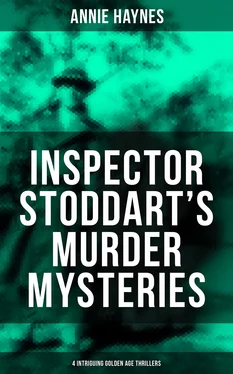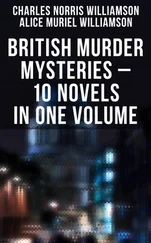This time it was the inspector who was fortunate. He moved the cabinet, and behind it was a small square blotting-book, apparently much worn.
The detective pounced upon it with a sound of triumph.
"At last!"
He took it over to the table nearest the window. Harbord bent over it with him. It was just an ordinary common little blotting-book such as might be picked up at any stationer's for a few pence, but right across the blue cover was scrawled "I.M. Houlton."
Inside there were several papers with little bits of the edges sticking out. The first that met their eyes as they opened it was a piece of common typing paper with the words "Five hundred—the old place" typed across. Beneath it was another, "As you wish. Tonight."
"From the same person as the one you found in the drawer," the inspector remarked as he turned over the next page.
Then he stopped as if petrified. There before him lay two or three sheets of notepaper of a texture and hue with which he was only too familiar. All of them were covered with words scrawled over and over again as if the writer had been trying to reproduce a sentence exactly and had been unable to satisfy herself.
"The—The—Man—Man—" in a curious printed style. It was slanted backwards and forwards, up and down. Then came other words at which the two men stared in silence for a minute. "—with—the—the—" Capital D's tried over and over again.
On the last sheet it was put together two or three times:
"It was the Man with the Dark Beard."
Table of Contents
"You know, Fee, Dr. Blathwayte said you ought to take eggs. And these are beautiful, fresh laid ones from the farm."
"I don't care if they are. I hate eggs. I am sick of the sight of them," Fee said sulkily. "And what is the use of talking about what Dr. Blathwayte says when you know I can't try his treatment?"
"Oh, Fee! Please don't," Hilary said, as she set the egg-nog on the table beside him. "Indeed I will do my very best to make it possible for you."
"No, you will not!" Fee contradicted, with a restless gesture that sent the light rug over his knees flying on to the grass.
The two were sitting under Hilary's favourite tree at Rose Cottage. It was a month since Iris Wilton's death and so far nothing very definite had been discovered with regard to it. The inquest had been adjourned time after time to give the police time to make their investigations. Suspicion of Basil Wilton was very strong and apparently deepening daily, but he was still at liberty. The papers were freely hinting at the supineness of the police and the superiority of the French methods and stating that across the Channel the Hawksview Mansions murderer would have been arrested weeks ago.
The strain and suspense of the past months had told upon Hilary. She was perceptibly thinner, the rounded contours of her cheeks and throat had sharpened and her brown eyes were sunken and had deep blue half-circles beneath them. The eyes themselves had a trick of filling with tears when nobody was looking.
She and Fee were alone at Rose Cottage now. Miss Lavinia was visiting some friends in London.
At first Fee had been fairly contented in the assurance that he was obeying the doctor's orders; but as time went on, and he heard nothing from Sir Felix as to any arrangements being made that would enable him to go to Dr. Blathwayte's nursing home for regular treatment, he grew impatient, almost as discontented as he had been when they first came down to the country.
He looked very cross now.
"I wonder how you would like to lie here all day and know that all the fellows of your own age were doing things, going to school and college, cricketing, rowing, dancing, while you were just rotting your life away. I suppose you never think of that?"
"Indeed I do." Hilary's voice was sad. "You know that I have always sympathized with you, Fee. If I could only make you well with a word—"
"A word!" Fee laughed contemptuously. "Yes! That wouldn't give you any trouble, would it? If it did—"
"What do you mean, Fee?" Hilary asked quietly. It was not the first time Fee had hinted at some secret knowledge, but he had never been quite so definite before.
"Mean!" he repeated passionately. "Why, I mean that the cost of the treatment would be only a bagatelle to Sir Felix, and if you would do what he wants I should soon be well, like other people."
"You don't know that, Fee," Hilary said with more firmness. "Dr. Blathwayte was not nearly so definite. He only said that he hoped to be able to do a great deal for you. And I know that Sir Felix thinks—"
"That he is not inclined to spend a lot of money on trying to help me while you persist in refusing him," Fee finished bitterly.
Hilary turned white.
"I don't know what you have heard or imagined, Fee. But you must understand that the ordering of my life is my own affair."
"Oh, quite! And you can muddle it up as you jolly well like. I know that," Fee returned angrily. "But when you will not have anything to do with a man like Skrine that we have known all our lives, and that was our father's dearest friend, and persist in hankering after a fellow like Basil Wilton, who will probably be hanged before long, I think it is time some one spoke out, and as I am your brother and your only male relative—"
There was a certain pomposity about Fee's tone that at a happier time would have made Hilary smile. Today she was only furiously angry.
"Fee! How dare you! You are simply an impertinent boy!"
Fee was in no wise abashed.
"It is time you heard the plain truth. Moreover, the 'Daily Wire' had a leaderette this morning saying what lots of people have thought, that it is an extremely curious thing that Basil Wilton should have been in two houses in which murders have been committed in the past three months. One is generally enough for a man's lifetime."
Hilary turned on him.
"Do you mean to insinuate that it was Basil Wilton who shot Dad?"
"It is not what I insinuate, it is what the 'Daily Wire' insinuates," Fee returned, unmoved. "And it is just what everybody is saying, so you may as well know it."
"I don't believe you or them or the 'Daily Wire'—the 'Daily Liar,' most people call it," Hilary stormed. "But I don't think that even the 'Daily Liar' would dare to say—"
She stopped as the garden gate clicked and Sir Felix Skrine came slowly across the grass to them. He was looking pale and worried, but smiled as he caught the end of Hilary's speech.
"What is it that the 'Daily Liar' would not dare to do, Hilary?" he inquired. "Between ourselves I always thought that there were no limits to the cheek of that lively journal."
"I don't think that there are!" Hilary retorted hotly. "But surely even the 'Daily Wire' would hardly dare to say that Basil Wilton murdered both my father and his wife. I thought in England a man was considered innocent until he was proved guilty."
Sir Felix drew in his lips. "Who told you that the 'Daily Wire' said that?"
"Fee has just told me so. I don't know where he had it from," Hilary returned, with a much displeased glance at her brother.
Sir Felix looked at him too.
"You must be careful what you say, Fee, or you will lay yourself open to prosecution for libel. I don't think the 'Daily Wire' has ever said that in so many words."
"Not in so many words, perhaps," Fee said, catching at the end of the sentence. "But it was put so that anybody could read between the lines."
"Ah, reading between the lines is not a particularly safe amusement!" Sir Felix said dryly.
"Sir Felix," Hilary said suddenly, "you don't believe that Basil Wilton killed my father or his wife, do you?"
Sir Felix obviously hesitated. "I have never even considered Wilton in connexion with your father's death, Hilary. With regard to his wife, I don't know"—speaking very slowly, with a little pause between each word—"I realize that the trend of public opinion is against him. And of course the circumstances are suspicious—distinctly suspicious. But there are one or two things, trifles in themselves, but decidedly in Wilton's favour. I think a good deal might be made of them in some hands."
Читать дальше












